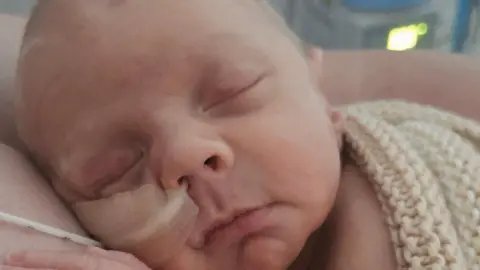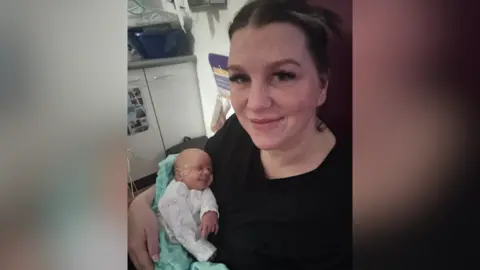'Stronger start' for premature baby in study
 North West Anglia Foundation Trust
North West Anglia Foundation TrustA mum is "forever grateful" to have taken part in a new study focused on treating premature babies who need help breathing.
Maria Lazinska, 37, joined a neonatal study at Peterborough City Hospital after her son Anthony was born at about 32 weeks into her pregnancy.
Babies born prematurely may need breathing support and can be treated with surfactant - a liquid medicine which helps the lungs function.
The research project, SurfsUp, compared two ways of administering the surfactant to babies less than 37 weeks' gestation.
Ms Kazinska, from Peterborough, said: "Anthony responded so well to the treatment — he grew stronger and more stable with each passing day."
 North West Anglia Foundation Trust
North West Anglia Foundation TrustSome premature babies have respiratory distress syndrome, which makes it difficult for them to breathe due to their lungs being immature.
While they can receive breathing support, some need additional treatment with surfactant.
Traditionally, it was administered through a tube inserted into the airway using a laryngoscope - a metal device that holds the airway open.
The study said it was effective but challenging and was thought to be painful for babies.
SurfsUp compared this to an alternative method of using a supraglottic airway, a different type of airway tube, which researchers said made it easier for doctors and more comfortable for babies.
Researchers said it was not known if it was as effective as the standard method, yet.
Ms Lazinska's son was the first in the East of England to join SurfsUp, which worked with the Children's Hospital, Glasgow, and Monash Hospital, Australia.
She said: "As a mother, seeing my baby get better filled me with so much joy and hope. I will never forget the relief I felt watching him breathe more easily and fight so bravely.
"We are forever grateful for this opportunity that gave our little boy a stronger start in life."
Dr Nikhil Ganjoo, consultant paediatrician and principal investigator for the study, added: " It is very exciting for our unit to be engaged with Neonatal research with the hard work and dedication of our research nurses and the neonatal nurses.
"We currently recruit for four international studies on our neonatal intensive care unit, with one of the studies being the highest recruiting non-commercial trial for our trust."
Follow Peterborough news on BBC Sounds, Facebook, Instagram and X.
